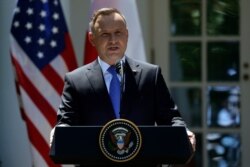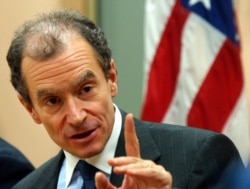President Donald Trump said Thursday that he was pulling out of attending events in Poland to mark the 80th anniversary of the start of World War II so that he could ensure all federal resources were focused on the arrival of Hurricane Dorian, which was heading to Florida from the Caribbean.
At the start of a White House Rose Garden event to launch the U.S. Space Command, Trump announced that Vice President Mike Pence would take his place in Warsaw.
"It's something very important for me to be here, the storm. Looks like it could be a very, very big one indeed," he said.
The hurricane was forecast to reach Category 4 strength while approaching Florida's eastern coast on Monday night, after the time that Trump had been scheduled to return from Poland.
The president said he had phoned Polish President Andrzej Duda to explain that his "highest priority is the safety and security of the people in the path of the hurricane. And I will be rescheduling my trip to Poland in the near future."
Speech was planned
Trump, along with Duda and German Chancellor Angela Merkel, had been scheduled to speak Sunday at a ceremony in Pilsudski Square.
During his planned two-day trip, the U.S. president also was to hold one-on-one meetings with several of the other 40-plus leaders attending the events.
This would have been Trump's second visit to Poland, and he has hosted Duda twice at the White House.
Nearly two dozen former Polish ambassadors had written an open letter to Trump asserting that their country's democracy was in jeopardy and urging him to use his visit to pressure Poland's populist government to respect human rights and stop flouting the constitution.
"Mr. President, you are coming to a country where the rule of law is no longer respected," declared the Conference of Ambassadors of the Republic of Poland.
A former U.S. ambassador to Poland, Dan Fried, said Wednesday that he hoped Trump would make it clear to Poland's leaders "that democracy and the rule of law are critical” and have been “the fuel that drives American-Polish relations."
During his 2017 visit, Trump gave a speech praising Poland as a defender of Western civilization, but he did not mention concerns that the young democracy was veering off course.
The latest visit would have also highlighted enhanced military cooperation between Washington and Warsaw.
"The Russians hate it," Fried said of the growing defense relationship between the United States and Poland.
Demonstration for Putin
Fried, also a former assistant secretary of state for European and Eurasian affairs, added, "Having American and non-U.S. NATO forces in the Baltic states and Poland shows [Russian President Vladimir] Putin that we are capable of drawing a line and stay standing by it."
U.S.-Poland Business Council President Eric Stewart predicted "Putin is going to move a lot of assets closer" to the borders with Poland and other European Union states and "he's going to use energy to continue to be a part of his counterstrategy," as well as improve relations with Central Asian countries and Belarus.
After Britain exits the European Union, the Poles "will be our next biggest best friend in the EU," even closer to the United States than France or Germany, said Stewart, a former deputy assistant secretary for Europe and Eurasia at the Commerce Department.
Stewart said he was thrilled Pence would be making the trip "to represent the Trump administration's views in these important talks with the Polish government to open up new investment opportunities for U.S. companies in Poland, particularly in the growing defense and energy sectors."







